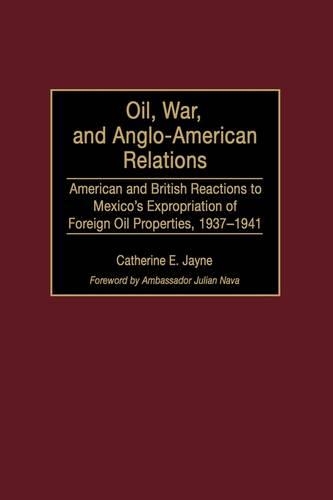
Oil, War, and Anglo-American Relations: American and British Reactions to Mexico's Expropriation of Foreign Oil Properties, 1937-1941
(Hardback)
Publishing Details
Oil, War, and Anglo-American Relations: American and British Reactions to Mexico's Expropriation of Foreign Oil Properties, 1937-1941
By (Author) Catherine E. Jayne
Bloomsbury Publishing PLC
Praeger Publishers Inc
30th December 2000
United States
Classifications
Tertiary Education
Non Fiction
Petroleum, oil and gas industries
International economics
International relations
338.2728209
Physical Properties
Hardback
232
Description
The Mexican expropriation of British and American properties in March 1938 marked the first time any oil-producing country successfully stood up to foreign companies who claimed to own oil properties in that country and who had the support of their respective governments. Totally reliant on overseas oil at a time when war seemed imminent, British officials responsible for policy toward Mexico immediately emphasized the importance of preventing other oil-exporting nations from following Mexico's lead. Washington also sought to make an example of Mexicoone that would guarantee respect for U.S. businesses operating abroad. Although both Washington and London wanted to return to the pre-expropriation status quo, Washington was unwilling to work with London to achieve this goal, and Washington's attitude paralleled its reaction to British efforts to get U.S. support on certain defense issues during this critical period. The resulting Anglo-American strife over how to handle Mexico was also consistent with Anglo-American commercial competition and the oil rivalry in Mexico early in the century.
Reviews
[A] solid study.-Hispanic American Historical Review
[A]n interesting discussion of the ways in which US and British policy intertwined and conflicted, showing the connections between them and the limitations on the options of the British that were a result of US action or lack of it. The author makes use of extensive primary materials and US and British archives, successfully, weaving her way through the intricacies of US policy and policymakers.-Advertise in Cambridge Journals
[P]rovides a sober and meticulously researched account of an event of undeniable importance.-The International History Review
[A] solid study.Hispanic American Historical Review
"A solid study."-Hispanic American Historical Review
"An interesting discussion of the ways in which US and British policy intertwined and conflicted, showing the connections between them and the limitations on the options of the British that were a result of US action or lack of it. The author makes use of extensive primary materials and US and British archives, successfully, weaving her way through the intricacies of US policy and policymakers."-Advertise in Cambridge Journals
"Provides a sober and meticulously researched account of an event of undeniable importance."-The International History Review
"[A] solid study."-Hispanic American Historical Review
"[P]rovides a sober and meticulously researched account of an event of undeniable importance."-The International History Review
"[A]n interesting discussion of the ways in which US and British policy intertwined and conflicted, showing the connections between them and the limitations on the options of the British that were a result of US action or lack of it. The author makes use of extensive primary materials and US and British archives, successfully, weaving her way through the intricacies of US policy and policymakers."-Advertise in Cambridge Journals
Author Bio
CATHERINE E. JAYNE is an independent scholar who has taught at the London School of Economics, the University of Paris, University of California, Los Angeles and California State University, Northridge./e
